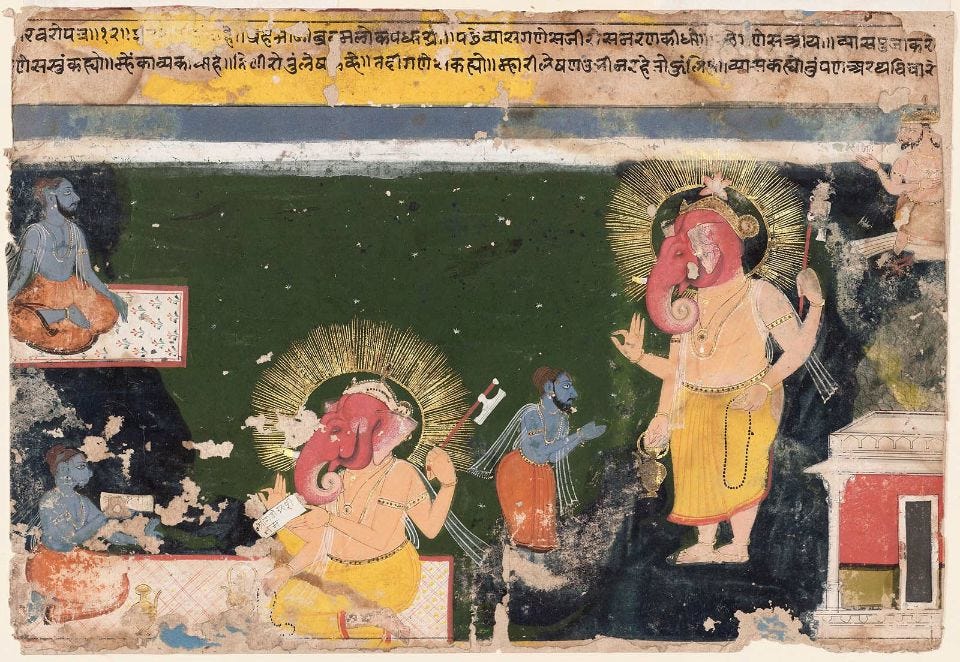Jayary Newsletter # 92

Simplification
As we know, the Mahabharata has a Sanskrit source but it has variants in almost every Indian language and perhaps several non-Indian languages as well. It's both popular and prestigious; both Big Tradition and small-tradition.
By basing our exploration on the Jaya instead of a more obviously philosophical text, I am rejecting the castle in favour of the street. It's a self-conscious aping of the zen claim of being a direct transmission outside the scriptures. After all, the apocryphal founder of Zen - the monk Bodhidharma - was from Kanchipuram, not too far from my family seat. We need more of that direct fierceness. Enough with the gentle medium pace of academic philosophy already.
The scriptures are dead, but the story lives on in everyone. It all boils down to a famous Einstein quote: "Make things as simple as possible, but not simpler."
Note: He didn't actually say that; the original quote is much more complex and Germanic, so you could say the paraphrase is a self-justifying example of simplicity.
If modernity is a codeword for a global hydra, we can only simplify it so much. Unleashing the Jaya on the m-world strikes me as exactly the simplification without oversimplification we need.
Trumpary
What a difference this week! I write my Jayaries a few days in advance, so I am writing about Thursday's Jayary on Sunday. Meanwhile, Donald Trump has become the President of the United States, which is being taken by many of my friends as the equivalent of the apocalypse. I don't know about the apocalypse, but he has appointed a major climate denier as the head of the EPA (Environmental Protection Agency) transition team. That's not good news.
Then there are those who think that Trump is a better choice than the alternative. Among my friends, this camp has two (very different) types of adherents:
Those who think Trump will keep the bad guys out of the country or six feet under.
Those who think Trump is so bad that it signals the end of the American empire.
If ever there was a world situation which calls for a Jayaric analysis, it's today's world. Will world war break out in three years? Will we muddle along for another thirty before unprecedented temperature rise makes it uninhabitable? How do egos and desires combine to produce a result no one wants? These are questions posed by the Jaya. These are also questions we should pose to ourselves today.
Causes upon causes
The Mahabharata shows that great catastrophe can emerge out of causes piling upon each other until there's a phase shift and the whole system collapses.
For example, let's consider the dice game. If only Yudhisthira hadn't built Indraprastha on top of the ashes of the Khandava forest. If only the Pandavas hadn't invited Duryodhana to the inaugural. If only Duryodhana hadn't fallen into a clear pool. If only the Pandavas hadn't made fun of him for doing so. If only Yudhisthira hadn't kept betting one possession after another.
And so on.
No single cause leads to ruin but collectively they are the undoing of the greatest civilization. You know what's even more depressing? That Duryodhana and Yudhisthira and others were acting according to their dharma. Why wouldn't a king build a great city by tearing down a forest? Why wouldn't he invite his cousins to the unveiling of a great palace? Why wouldn't they laugh cousin who has tried to kill them on several occasions? Why wouldn't that cousin recoil from the humiliation with redoubled anger? Why would that cousin show forgiveness after winning the dice game?
In other words, even with all the wisdom in the world, could they have done anything different? If not, is there any hope for us?


